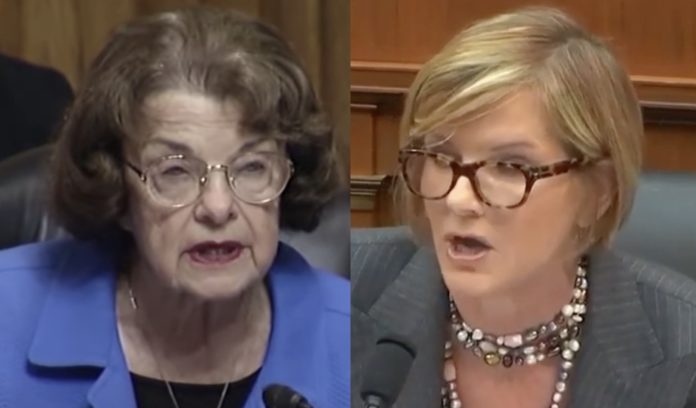OPINION | This article contains commentary that reflects the author's opinion.
A bombshell report accuses 14 members of Congress of being in danger of violating the STOCK Act, which is meant to prevent members of Congress from participating in insider trading.
Since members of Congress often have access to confidential or non-public information, it’s illegal for them to use this information in order to trade a company’s stocks or other securities.
The STOCK Act, which is a 2012 provision, is an acronym for “Stop Trading on Congressional Knowledge Act.”
Republicans listed in the “danger” zone of financial compliance include Rep. Pat Fallon of Texas; Rep. Dan Meuser of Pennsylvania; Rep. Blake Moore of Utah; Rep. Lance Gooden of Texas; Rep. Diana Harshbarger of Tennessee; Rep. Kevin Hern of Oklahoma; Sen. Tommy Tuberville of Alabama; and Rep. Chris Jacobs of New York.
Democrats accused of violating the STOCK Act include Sen. Dianne Feinstein of California; Rep. Susie Lee of Nevada; Rep. Tom Malinowski of New Jersey; Rep. Sean Patrick Maloney of New York; Rep. Kim Schrier of Washington; and Rep. Tom Suozzi of New York.
These 14 Congress members have failed to properly disclose financial trades, according to the report.
“These lawmakers have violated the Stop Trading on Congressional Knowledge Act of 2012 by failing to properly disclose financial trades, many to a significant degree,” Insider reported.
“Some also employ senior staff members who’ve violated the STOCK Act or haven’t themselves taken proactive steps to avoid potential conflicts of interest,” the report added.
More from Western Journal:
Perhaps the most prominent member of Congress listed among the 14 is Feinstein.
The senator violated the STOCK Act one time, which totaled about $15,000. She said that she paid the fine for not disclosing her trade, but did not provide any proof.
Schrier violated the act once, totaling at least $500,000. Schrier did not comment or confirm whether the fines had been paid.
Other members of Congress reportedly violated the STOCK Act over 100 times.
Fallon had 118 late disclosures, which totaled about $9,113,000.
“Upon learning of his STOCK Act violation, Congressman Fallon self-reported himself to the Ethics Committee and proactively paid his fines. The congressman has not been late on reporting stock transactions since his discovery of his first infringements,” Austin Higginbotham, Fallon’s communications director, said in a statement.
Suozzi violated the STOCK Act about 300 times, which resulted in at least $3,200,000. Suozzi did not comment on whether he had paid the fines necessary for these violations.






